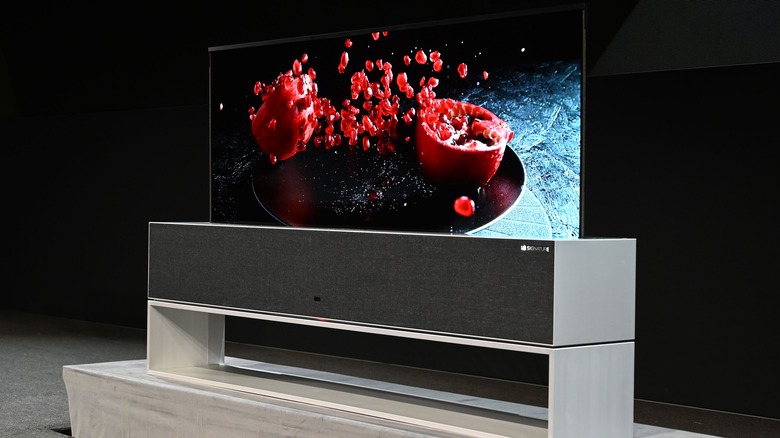Do You Need A New TV With The Next-Gen Consoles?
With new consoles come new promises, and when the PlayStation 5 and Xbox Series X arrive this coming holiday, a slew of new features will make their way into the living room. Solid state storage drives — which boost loading times considerably — will finally come to Sony and Microsoft's machines. And graphics will get an enormous bump, leaving the now underwhelming visuals of 2013 in the dust.
It's that latter subject, though, that might have you shelling out more dough than you're anticipating, and that's aside from the fact that 4K still isn't the norm in most households. Both Sony and Microsoft are shooting for 4K and 60 frames-per-second as the standard, which will require you to upgrade that old 1080p or 720p set to something more modern. But even if you're one of the lucky ducks with a 4K TV right now, there's still no guarantee it'll support everything the PS5 and Series X have to offer when they launch.
Yes, the TV you own could be outdated already.
Let's start with something relatively simple: frame rate. Console gamers have long lamented console frame rates, which have largely been held back due to underpowered CPUs. That should change with the introduction of the PlayStation 5 and Xbox Series X, as both systems are targeting 4K and 60 frames-per-second as the bare minimum. That's on par with a fairly powerful PC, and is without question a step in the right direction.
But Sony and Microsoft want to take things further, and that's where your current TV might begin to show its age. The PS5 and Series X also plan to shoot for 8K visuals in some titles, and will also have some games capable of displaying at 120 frames-per-second. Even if you splurged on a new TV in the last few years, the odds are good that it tops out at 4K and 60 frames-per-second. Time to break open the piggy bank.
Fancy new buzzwords like "auto low-latency mode" and "variable refresh rate" are being thrown around, too — primarily on the Xbox Series X side. Auto low-latency mode activates the "game mode" of your TV automatically. Variable refresh rate changes the refresh rate of your set to match the frames-per-second output of a game. These sound like great features, and should make your gaming experience all the more enjoyable. But these features — much like support for 8K and 120 fps — require your TV to have an HDMI 2.1 port. The sad reality is, at this point in time, not many sets do.
This isn't to take away from what the PlayStation 5 and Xbox Series X are trying to accomplish. If you're a dedicated console gamer but you've been jealous of the advances made in PC gaming, you'll soon get a taste of what those so-called "PC elitists" have been raving about. Playing your favorite titles at 4K and 60 frames-per-second is life changing, and it's a shame it took this long for consoles to catch up.
But as far as some of these next-gen features go, it's worth remembering you may not see all the benefits right away. The tech they're taking advantage of isn't commonplace yet, and may require you to buy a brand new TV in the future.
Still, this isn't a bad thing. The PlayStation 4 and Xbox One weren't future-proofed in the slightest when they launched; in fact, they were woefully underpowered the moment they rolled off the manufacturing lines. The PS5 and Series X are looking to stay relevant for years to come by supporting features most people haven't even heard of yet. So yes — you may feel compelled in 2022 or 2023 to visit Best Buy and squint at the lineup of 8K TVs the retailer has on display. But you can at least rest easy knowing a new TV will unlock new capabilities in the PS5 or Series X you already purchased.
It's still early in 2020, so we doubt we've heard about everything the PlayStation 5 and Xbox Series X will be capable of. Not only that, we're still in the dark about how much these systems will cost and when we'll actually get to buy them. Both Sony and Microsoft have teased a few details here and there, with Microsoft being the more transparent of the two. We're sure both companies have a few other tricks up their sleeves, though, which should make the next few months very interesting for console watchers.
As soon as we hear more about either the PlayStation 5 or the Xbox Series X, we'll fill you in.

